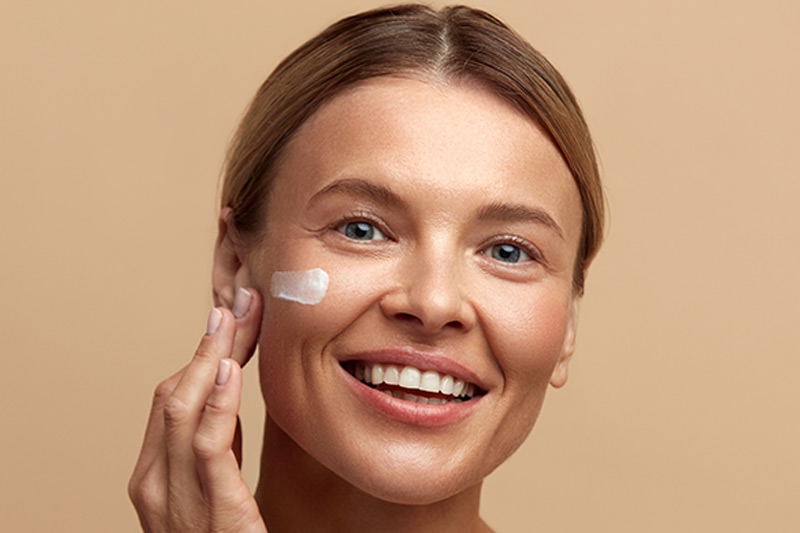Retinol has earned a reputation as the ultimate anti-aging ingredient. It is a form of vitamin A that increases cell turnover, slows down collagen and elastin degradation, smooths fine lines and wrinkles, and clears acne.
Serums and creams are skincare products with the highest concentration of active ingredients, such as retinol. This article explores the differences between a retinol serum and cream and how to add them to your skincare routine.

What Is a Retinol Serum?
A retinol serum is a skincare product with high retinol concentrations, formulated to reduce wrinkles and rejuvenate the skin. Its texture is aqueous or lightly oily, and it penetrates the skin faster and deeper than a cream. A serum typically has fewer ingredients.
What Is a Retinol Cream?
Retinol creams are moisturizers with retinol and hydrating agents that help reduce aging signs and strengthen the skin’s protective barrier to prevent moisture loss. Creams are thicker and contain emulsifiers, thickeners, and other ingredients. They are less irritating and drying on the skin than serums.
Note: Read our blog post with recommendations for the best moisturizers for aging skin.
Retinol Serum vs. Cream: What Are the Differences?
Retinol serums and creams have the same base ingredient but differ in the ingredient’s concentration and what other components are added. They also have a different texture and are intended for specific skin types.
Retinol Serum vs. Cream: Ingredients
Read product labels to learn if a product is a serum or a cream. The list of ingredients can also help you to differentiate between them.
Retinol Serum
A retinol serum has a higher retinol concentration than a cream. Depending on the product, it may have 0.1-1% retinol. It may include other active ingredients, such as antioxidants (vitamin C, vitamin E, or niacinamide).
Retinol Cream
Retinol creams contain retinol but also include moisturizing agents that hydrate the skin and lock in moisture, such as hyaluronic acid, ceramides, fatty acids (such as omega-3), and oils (experts recommend using retinol in combination with avocado oil). These help prevent redness, peeling, and flaking that retinol may cause, especially in first-time users.
Note: Read our article on retinol vs. hyaluronic acid and find out how they differ.
Retinol Serum vs. Cream: Skin Type
The main practical difference between retinol serums and creams is their intended skin type.
Retinol Serum
Retinol serums are suitable for people with oily, combination, or acne-prone skin because they are water-based and lighter. They penetrate deep without clogging the pores and leaving a greasy residue.
Note: Find the best skincare products for oily, acne-prone skin.
Retinol Cream
People with dry and sensitive skin should use a retinol cream instead of a serum because creams also hydrate and nourish besides delivering skin-tightening effects.
Retinol Serum vs. Cream: How to Use Them?
Skin experts recommend introducing retinol into a skincare routine with the early signs of aging that appear in our 20s.
Note: Find out when to start using anti-aging products, and which products to use.
It is important to introduce retinol gradually because it can cause irritation. During the first several weeks, apply it once or twice weekly. When the skin gets used to it, increase the frequency to once or twice daily.
Retinol products are usually used in the evening because retinol increases sensitivity to the sun. If you use it in the morning, make sure to apply sunscreen.
Note: Check out our tips on how to choose a sunscreen.
Retinol Serum
Thoroughly wash your face with a cleanser. Apply a thin layer of the retinol serum. Follow with your evening serums and a moisturizer. Always use retinol at night and be sure to wash your skin and use sunscreen the next morning.
Note: Discover other skincare ingredients that are best to use at night and learn how to build an effective night skin care routine.
Retinol Cream
Cleanse your face. Apply your usual combination of products – toner, serum, or none. Apply the retinol cream as the final step in your evening skincare routine. The next morning it is important to wash your face, apply serums, and use a sunscreen.
Retinol Serum vs. Cream: Side Effects
Retinol is a potent skincare ingredient that can potentially cause the following skin issues:
- Redness
- Dryness
- Itchiness
- Burning
- Peeling
- Flaking
Introduce products that contain retinol gradually to avoid unpleasant symptoms.
Retinol Serum vs. Cream: Which One to Choose?
Choosing a retinol serum or cream depends on the user’s skin type and specific skin concerns. In general, oily skin benefits from serums, whereas a cream is more suitable for dry and sensitive skin.
People who want to address specific aging signs, such as wrinkles, hyperpigmentation, or acne, may achieve better results with higher retinol levels in a serum. On the other hand, those looking for a multipurpose skincare product that reduces aging signs while nourishing and protecting the skin should choose a retinol cream.
Can I Use Retinol Serum and Retinol Cream Together?
You can use a retinol serum and cream together, but two retinol products increase the chance of irritation. If you choose to combine them, apply both products in thin layers.
Conclusion
Retinol is the star ingredient in rejuvenating skin care, helping to plump, smooth, and strengthen the skin. Retinol serums and creams have the highest concentration of this ingredient among topical skincare products.
Use them according to your skin type and specific skin concerns and be patient. It may take several months to see the desired results.
If you need help creating the best skincare plan for your needs, consult our skin experts at Vibrant Skin Bar. They will assess your skin type and concerns, help you choose the best retinol products, and advise you on how to use them.


